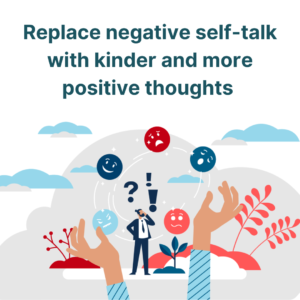Emotions are an integral part of our existence, it’s what makes us human and also determine the quality of relationships be it personal or professional life. Emotions can also be extreme happiness, sadness or even anger. We are not born with the intrinsic ability to regulate our emotions it is something we need to learn and practice.
Humans respond differently to the same situation and have differing approaches to manage and respond to our emotions based on observations, previous experiences, or other environmental influences. These feelings vary in depth and intensity, and sometimes they can be emotionally overwhelming or unmanageable. Regulating our emotions is acknowledging and accepting ourself while reducing the chance of engaging in unhealthy behaviors. When we regulate our emotions, we are practicing a skill to control or manage our emotions in a healthy and safe manner. Emotional regulation is possible to learn at every stage of life.
Definition
Emotion regulation is a process by which individuals manage the intensity of their emotions to best respond to their current environment. Regulating one’s emotions through utilizing skills to cope with changes in their emotional state. Emotion regulation can occur with or without support from another individual.
Importance of Self-Regulation
Improved Relationships: Better management of emotions leads to healthier interactions & relationships.
Enhanced Decision-Making: Reduced emotional interference allows for clearer thinking.
Greater Resilience: Ability to handle stress and recover from setbacks.
Professional Success: High self-regulation is linked to leadership and workplace effectiveness.
An Inspiring Story of Steve Jobs
In 1985, Steve Jobs was ousted from Apple, the company he co-founded. Rather than being consumed by anger or despair, Jobs used this setback as an opportunity for self-growth and reinvention. Below are the key points of self-regulation which are as below:
Resilience: Jobs maintained his vision and continued to pursue his passion for technology and innovation.
Learning from Failure: He founded NeXT, a new computer company, and acquired Pixar, which became a highly successful animation studio. These ventures allowed him to apply lessons learned from his failures.
Patience and Adaptability: Jobs did not rush his projects but rather took the time to develop innovative products. His patience paid off when NeXT’s technology was later integrated into Apple’s systems.
Long-Term Focus: Despite the setback, Jobs kept his long-term goals in mind. His return to Apple in 1997 marked a period of remarkable innovation and success for the company and led to the creation of iconic products such as the iMac, iPod, iPhone, and iPad, which transformed the tech industry and Apple’s fortunes.
Ways to Regulate Your Emotions
Developing emotional regulation skills to navigate life challenges is essential. Incorporating these practices into daily life helps enhance emotional well-being, improve relationships, and navigate the ups and downs of life with greater resilience and satisfaction
1. Emotional Acceptance: Understand emotions by acknowledging and accepting them without judgment. This practice helps skillfully respond to feelings rather than reacting impulsively or suppressing them. Remember, all emotions are valid and can teach something.
2. Explore How You Feel: Various factors can impact how we feel. Self-check your responses to stress, anxiety or natural body cues (i.e., sleepiness) & how does it influence your ability to regulate emotions.
3. Name Your Emotions: Naming is an effective way to master our emotions. We gain self-understanding when we can clearly identify and label our feelings as it allows us to step back and evaluate how to address the circumstance. Try to use specific words to describe our emotions, such as “frustrated,” “excited,” or “anxious.”.
4. Practice Mindfulness: Mindfulness involves paying attention to the present moment with non-judgmental awareness. When we practice mindfulness, you cultivate an ability to observe your emotions without getting overwhelmed.
5. Identify Your Triggers: Identifying our triggers helps us to prepare for emotionally challenging situations. We gain opportunities to develop appropriate coping strategies to regulate. Understanding triggers is the first step in effectively managing our emotional responses.
6. Practice Self-Compassion: Let’s remember that everyone has challenging moments, and you are not alone. Offer yourself the same support and compassion you would provide a friend. Feeling a range of emotions is normal, and self-compassion helps you navigate life through a positive lens.
7. Challenge Negative Self-Talk: Challenge negative or self-critical thoughts with more compassionate statements. Reframe your thoughts from negative to positive or neutral. Practice self-awareness to catch and replace negative self-talk with kinder and more positive thoughts.
8. Take a Break Before Responding: When facing intense emotions, give yourself some space and time to cool down. Take a step back to gain perspective and avoid impulsive reactions.
9. Start an Exercise Routine: Engaging in regular physical activity releases endorphins, which can help in improving your mood and reduce stress. It can be as simple as walking, practicing yoga, or engaging in team sports.
10. Seek Professional Guidance: Seeking professional guidance can be highly beneficial if you struggle with emotional regulation. A trained mental health professional can provide a valuable perspective as well as helpful strategies to help you enhance your emotional regulation abilities.





Leave a Reply